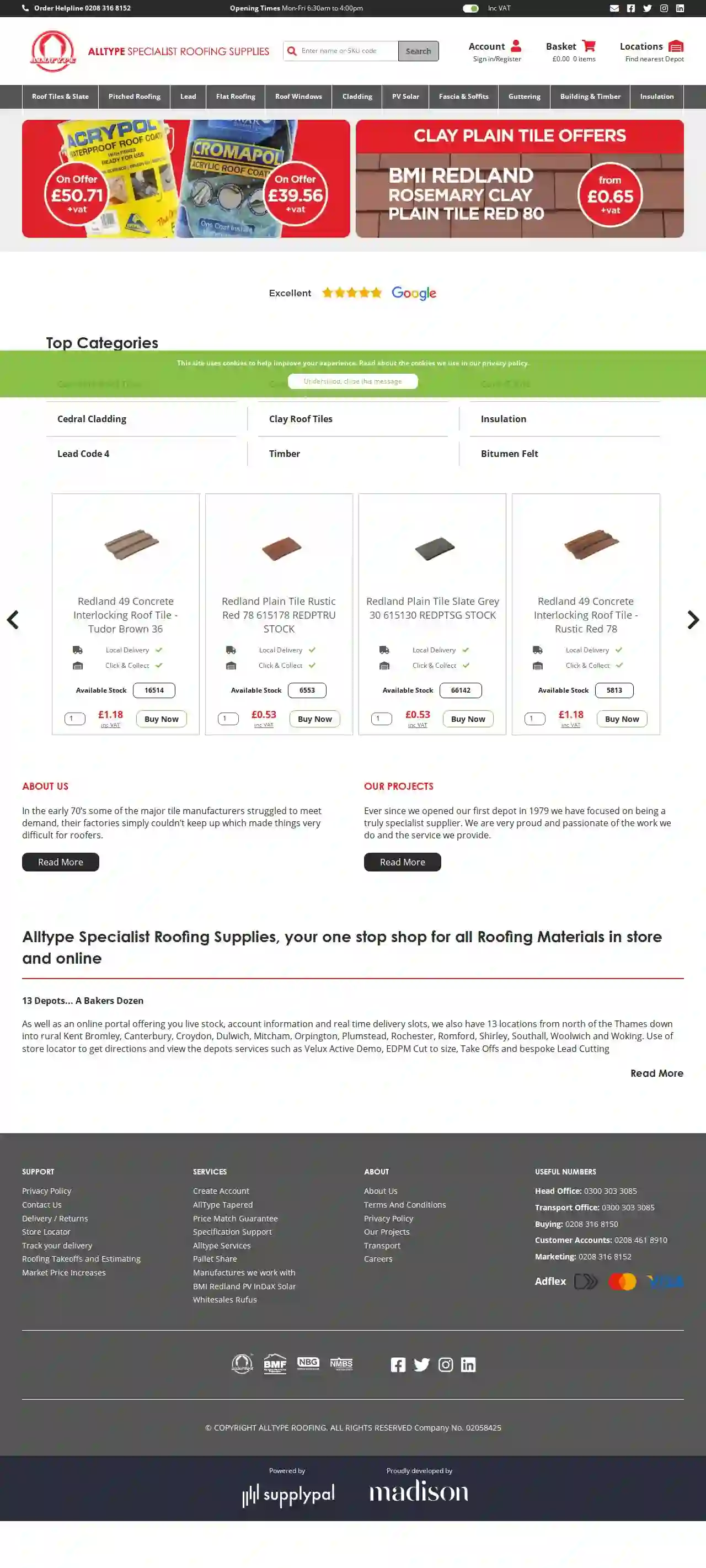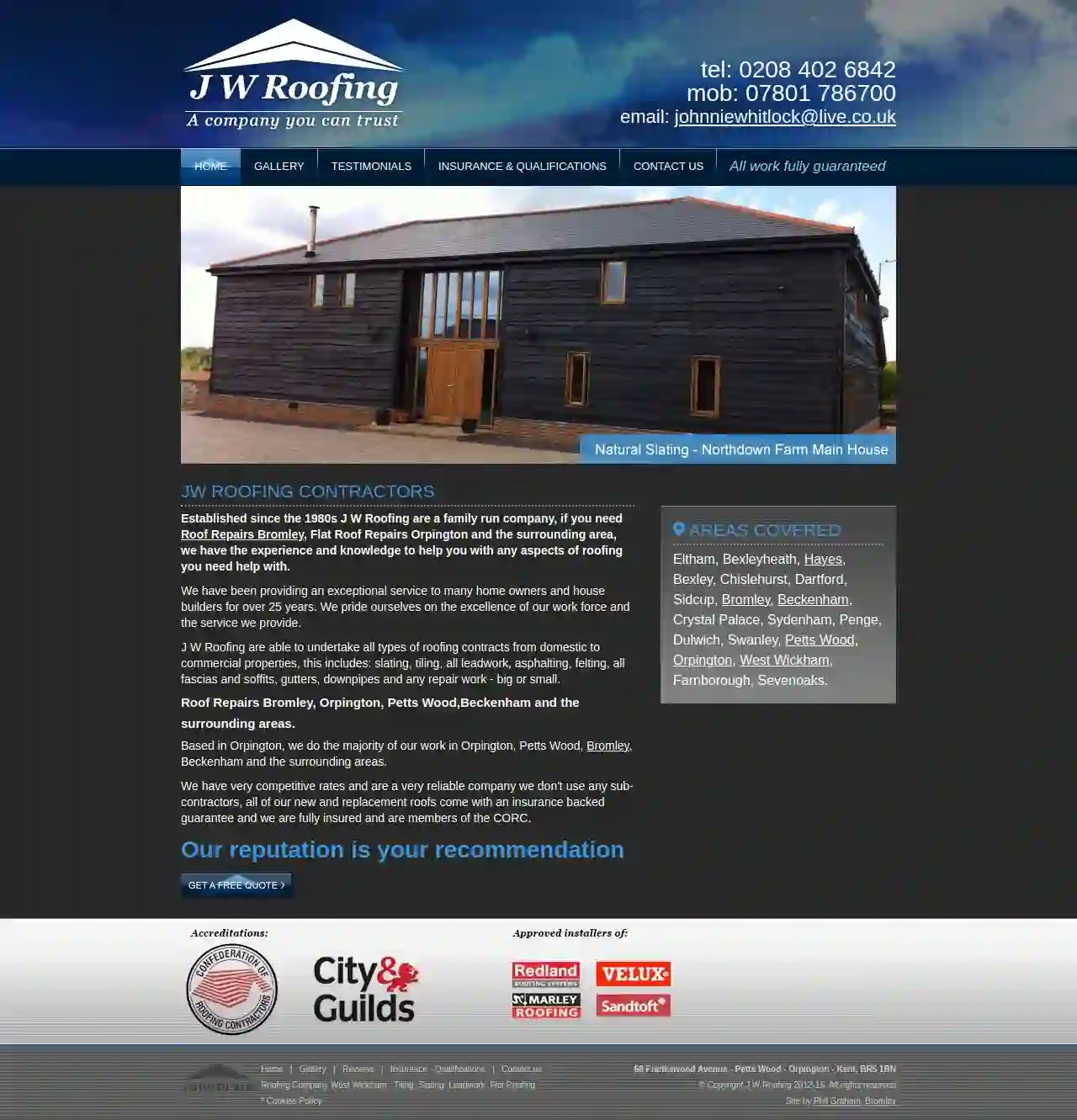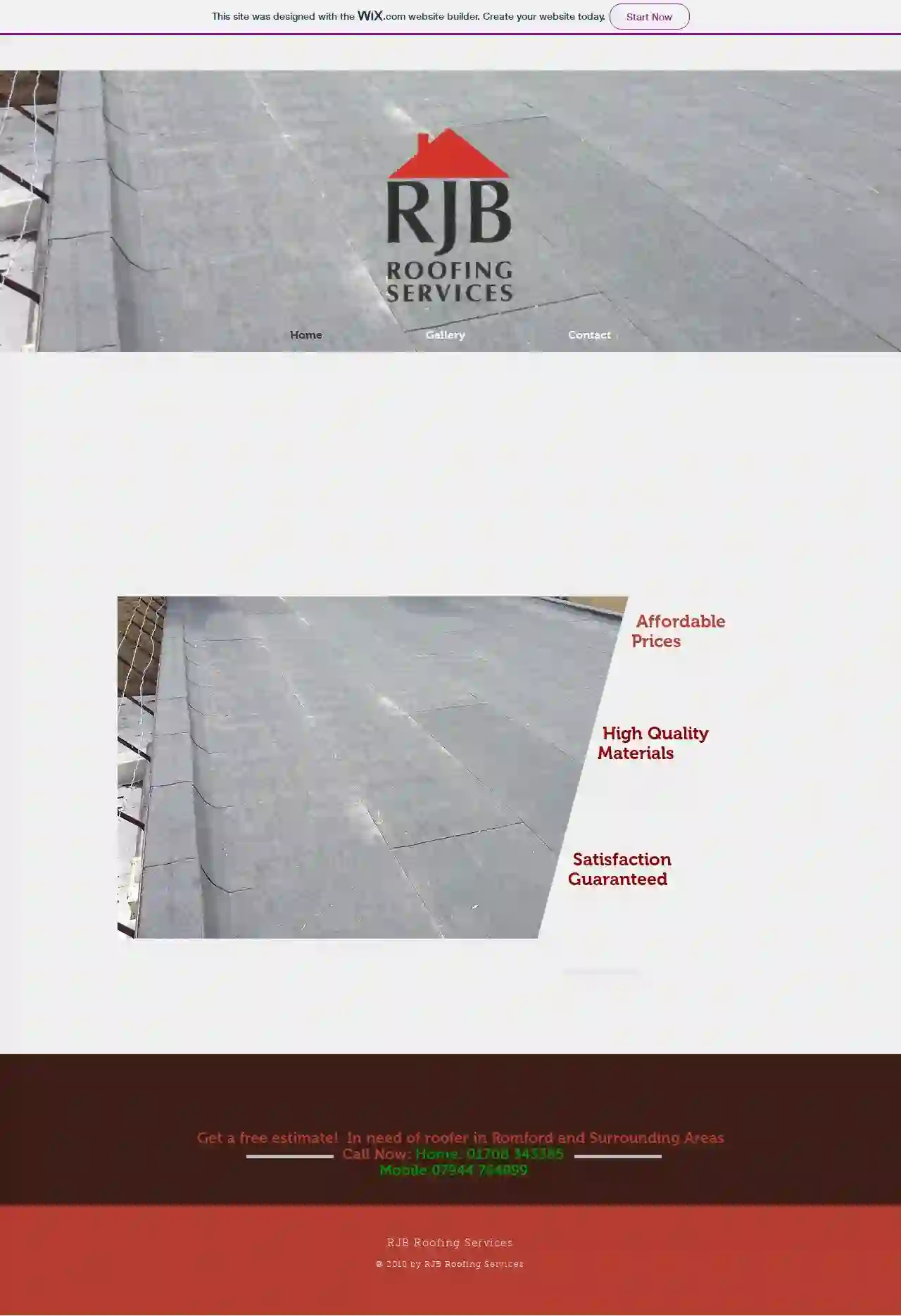Tile Roof Repairs Dagenham
Find top Tile Roof Repairs in Dagenham
Get multiple Repair Tile Roof quotes for your project today! Compare profiles, reviews, accreditations, portfolio, etc... and choose the best service.

R J Evans Flat Roofing Limited
4.715 reviews1 Palmers, 101 Crow Green Road, Brentwood, Essex, CM15 9RP, GBRJ Evans Flat Roofing Ltd are a roofing contractor based in Brentwood, Essex. We have developed a reputation as one of London's leading flat roofing companies and aspire to be one of the leading roofers in the UK. Our specialist roofers provide flat roofing services for residential and commercial clients across London, Essex and the whole of the UK. In addition to our roofing services we also provide specialist waterproofing services including the installation and repair of asphalt steps, balconies. As well as basement tanking. Whatever your roofing or waterproofing needs we will provide you with the highest levels of customer service. All our work comes with full guarantees of up to 40 years. And our roofers will make sure your work is finished on time and within budget. Throughout any project you undertake with us you will benefit from our dedicated support team before, during and after your project is complete. From roof repairs and flat roof replacements to asphalt steps we will give you the highest quality service. If you would like to contact us about anything about roofs or waterproofing just pick up the phone today and call 01277 260 204, one of our friendly team will be delighted to help.
- Services
- Why Us?
- Accreditations
- Our Team
- Testimonials
- Gallery
Get Quote
Specialised Roofline Supplies (Hampshire) Ltd
52 reviews3 Stanhope Gate, Yorktown Business Park, Yorktown, GBSRS UPVC is your one-stop shop for all your building, roofing, window and door products. We pride ourselves on offering a wide range of high-quality products at trade prices, all under one roof. Whether you're looking for fascia and soffit, guttering, windows, doors, or roofing materials, we have everything you need to complete your project. Our team of experts is always on hand to offer advice and guidance, ensuring you choose the right products for your needs. We also offer a bespoke service for windows and doors, so you can be sure to get the perfect fit for your home. At SRS UPVC, we're committed to providing our customers with the best possible service and products. We're proud to be a trusted supplier to both trade professionals and DIY enthusiasts alike. Visit our showroom in Folkestone or Farnborough today to see our full range of products.
- Services
- Why Us?
- Gallery
Get Quote
A1 Roofing Romford
53 reviews14 Main Road, Romford, RM1 3DA, GBA1 Roofing Romford is a roofing services company based in Romford, Greater London, UK. We offer a range of services including roof insulation, guttering, soffits repair & replacement, fascia repair & replacement, roof waterproof membrane, and chimney repair. Our team is dedicated to providing 24-hour, seven-day-a-week roofing services to our clients in Romford and surrounding areas. We serve a diverse clientele, including residential and commercial customers, and are committed to delivering high-quality workmanship and excellent customer service.
- Services
- Why Us?
- Accreditations
- Our Team
- Testimonials
- Gallery
Get Quote
CJ Roofing and Property Maintenance Ltd
4.825 reviews22 Stalisfield Place, Orpington, BR6 7HN, GBC J Roofing & Property Maintenance Ltd is a family-run roofing company with a great reputation across Kent. We work as flexibly as possible for you, the client, and can outline the materials and processes we use, work weekends if needed or even extend our hours into the evening. We pride ourselves on resolving leaks, broken gutters, damaged tiles, and all other pitched and flat roofing issues in record time. Our team also fits the latest re-roofing products for long-term coverage that continues to look great in all seasons. We lend these skills to domestic and commercial properties across Kent, defending interiors from the rain often seen in Orpington, Bromley and the surrounding areas. When it comes to roofing and property maintenance, you needn't just take our word for it. Instead, you can find us on Rated People, Trustatrader and Checkatrade, where our reviews speak for themselves. For the ultimate peace of mind, we supply 10-year guarantees for all new roofs and five-year coverage for flat roofing systems.
- Services
- Why Us?
- Accreditations
- Our Team
- Testimonials
- Gallery
Get Quote
Alltype Roofing Orpington
4.615 reviewsUnknown, GBAllType Roofing is a leading supplier of roofing materials and solutions. With a wide range of products and services, we cater to the needs of both trade and DIY customers. Our extensive product portfolio includes roof tiles, slate, concrete roof tiles, clay roof tiles, pitched roofing, flat roofing, and more. We also offer a variety of accessories and fixings to ensure a seamless installation process. At AllType Roofing, we pride ourselves on providing excellent customer service, competitive pricing, and a commitment to quality. Whether you're a professional roofer or a DIY enthusiast, we have everything you need to complete your roofing project.
- Services
- Why Us?
- Accreditations
- Gallery
Get Quote
J W Roofing
3.912 reviews68 Frankswood Avenue, Petts Wood, BR5 1BN, GBEstablished since the 1980s J W Roofing are a family run company, if you need Roof Repairs Bromley, Flat Roof Repairs Orpington and the surrounding area, we have the experience and knowledge to help you with any aspects of roofing you need help with. We have been providing an exceptional service to many home owners and house builders for over 25 years. We pride ourselves on the excellence of our work force and the service we provide. J W Roofing are able to undertake all types of roofing contracts from domestic to commercial properties, this includes: slating, tiling, all leadwork, asphalting, felting, all fascias and soffits, gutters, downpipes and any repair work - big or small. Roof Repairs Bromley, Orpington, Petts Wood,Beckenham and the surrounding areas. Based in Orpington, we do the majority of our work in Orpington, Petts Wood, Bromley, Beckenham and the surrounding areas. We have very competitive rates and are a very reliable company we don't use any sub-contractors, all of our new and replacement roofs come with an insurance backed guarantee and we are fully insured and are members of the CORC. Our reputation is your recommendation
- Services
- Why Us?
- Accreditations
- Gallery
Get Quote
BulletProof Roofing
4.522 reviews2-2207 90B St SW, Edmonton, T6E 4M9, GBBulletProof Roofing is a trusted Edmonton roofing company dedicated to providing exceptional service and delivering honest work within your budget. We pride ourselves on the quality of every roof we install, ensuring your home is in safe hands with our trained professionals. From simple repairs to full roof installations, we've got you covered. We offer a wide range of shingle options in various colors and styles to complement your project. Our work is weatherproof and backed by 20+ years of hands-on experience. Contact us today for a professional estimate and experience the BulletProof difference!
- Services
- Why Us?
- Our Team
- Testimonials
- Gallery
Get Quote
RJB Roofing Services
551 reviewsRomford, GBWith over 20 years of experience in the Roofing trade, we provide roofing services for the domestic and commercial markets. Our Services Include: Flat Roofs (Repair or Removal) Roof Repairs Roof Replacement Tiling and slating Guttering and Downpipes uPVC Soffits and Facias Velux Installation Lead Work Repairs and Replacement Chimney Re-Pointing and Rendering Interior and Exterior Painting Garden Fencing Gutter Cleaning Driveway Cleaning Bricklaying And Much More Satisfaction Guaranteed Affordable Prices High Quality Materials Get a free estimate! In need of a roofer in Romford and Surrounding Areas Call Now: Home: 01708 343385 Mobile:07944 764899
- Services
- Why Us?
- Gallery
Get Quote
Weatherproof Roofing Inc.
4.9148 reviews15391 117 Avenue NW, Edmonton, T5M 3X4, GBWe’re on top of it. Specializing in roof replacement, emergency roof repair, and new roof installation. Your home’s best defence against moisture, the elements, and pests is its roofing. Edmonton homeowners want an affordable roofing contractor who has the experience and knowledge to fix or replace their roof. The skilled, professional roofers at Weatherproof Roofing will ensure any roof replacement or roof repair is done right the first time, every time. For metal roofing, tiles, shingles, or eavestrough, Edmonton residents trust Weatherproof Roofing to get the job done. When you choose us, you’ll enjoy a roof with superior aesthetic quality and the best level of protection for your greatest asset: your home.
- Services
- Why Us?
- Accreditations
- Our Team
- Testimonials
- Gallery
Get Quote
Coverall Roofing
GBWe Are The Cover All Roofing Lewisham ROofing service for your home With over 12 years experience and using Drones to Inspect Analyze and provide Roofing Solutions for our respected clients. Expert TeamProfessional and Experienced Roofing Services in Lewisham Safe ProcedureWe are fully insured to ensure your safety and ours. Health and Safety is always paramount Best QualityEnsuring the best products and tools are used for the job ensuring the longevity of your roof Who We Are We are Qualified & Professional Roofers Thank you for visiting Coverall Roofing in Lewsham. We are experienced Roofers and are always at hand to offer sincere and expert advice on any Roofing Queries you may have. Our Services roofers lewisham All our Roofing services work is guaranteed for between 5 to 15 years depending on the type of work carried out. We carry out more services than are perhaps listed on our website. So please for any Roof Related queries please get in touch today All Services Roof InstallationsIs your Roof old, tired and in need of replacing. We understand that this can be quire an expensive investment, however we are at hand to provide a professional and competitive quote Roof RepairsIgnoring a Roofing problem wont make it go away. Damaged Roofs can only cause more problems which can cost alot more. Why not get it repaired as soon as. GutteringGuttering, Fascias and Soffits help ensuring rain water is drained properly and not seeping into house walls which can impact pointing and brickwork. We are competitvely priced so why not get in touch “Would Highly Recommend Cover all Roofing, Guys were brilliant Always cleaned up after themselves which is always a plus…” Braydon Butler Why Choose Us Experienced Roofers in lewisham We are your Local Based Roofers in Lewisham. We have over 12 years experience and all our Roofing work is guaranteed for 5 to 15 years*We are a customer focused roofing company and our business growth is dependent on your full satisfaction. Our VisionOur vision is just to be recognised as the go to roofing company in Lewisham. Our MissionTo ensure our customers are completely happy with our work and to recommend us to others. Work Process How We Works From point of contact to work completion you will find our roofing team friendly efficient and professional. All our Roofing work will have a guarantee of between 2 to 10 years depending on the type of work you choose to carry out with us Free QuoteWe will inspect your roof and come to an agreement in term of price but in terms of solution for your Roof, Whether that be a Roof Repair or New Roof in Lewisham or Ssurrounding areas Roofing Services in lewisham and surrounding areas Roofing services With over 12 Years experience in Roofing, we are happy to assist you in any way. Please get in touch with us if you require and further information All Services RoofingServicesCall now Roof Repairs Roof Installations Storm Damage New Roofs Ridge Tile Roofing Roof Lanterns OtherServicesCall Now Guttering Fascias Soffits Velux Roof Windows Skylights and more Testimonial Client Review Your local roofing company is built on reputation so we would like to thank our existing clients and hope to share similar 5* reviews to our new customers.
- Services
- Why Us?
- Our Team
- Testimonials
- Gallery
Get Quote
Over 12,314+ Roofers on our directory
Our roofing pros operate in Dagenham and surrounding areas!
Roofyng.co.uk has curated and vetted the Best Roofers in Dagenham. Find a top & reliable pro today.
Tile Roof Repair FAQs
- Snow Load: Ensuring the roof structure can handle the weight of accumulated snow.
- Freeze-Thaw Cycles: Using freeze-thaw-resistant tiles and proper installation techniques to prevent damage from expansion and contraction.
- Ice Dams: Installing ice and water shields and ensuring proper attic ventilation to minimize the risk of ice dams.
- Affordability: Concrete tiles are generally more affordable than clay or slate tiles.
- Durability: They are durable and resistant to impact, fire, and insects.
- Versatility: Available in various colors, styles, and profiles, mimicking other materials like clay or slate.
- Weight: Concrete tiles are heavy, requiring a strong roof structure.
- Longevity: While durable, they have a shorter lifespan than clay or slate (typically 30-50 years).
- Fading: The color of concrete tiles can fade over time due to sun exposure.
- Prepare the Area: Cover plants and landscaping near the house with tarps to protect them from cleaning solutions.
- Apply a Cleaning Solution: Use a garden hose to wet the roof surface, then apply a moss-killing solution. You can find specialized roof cleaning products at home improvement stores or consult a professional roof cleaning service for recommendations. Follow the product instructions carefully.
- Scrub the Roof (if necessary): For stubborn moss, use a soft-bristled brush to gently scrub the tiles. Avoid using a pressure washer, as it can damage the tiles and force water under the roofing material.
- Rinse Thoroughly: Use a garden hose to rinse the cleaning solution and moss debris from the roof. Ensure all residue is removed.
- Cracked or Broken Tiles: Caused by impact from hail, falling debris, or foot traffic.
- Loose or Slipping Tiles: Due to deteriorated underlayment, improper installation, or shifting roof structures.
- Leaks: Around flashing, valleys, or penetrations if the installation wasn't done correctly or if the flashing has degraded.
- Moss Growth: Especially in damp, shaded areas, leading to aesthetic issues and potential damage over time.
- Efflorescence: A white, powdery deposit that can form on the surface of concrete tiles due to mineral salts being drawn out by moisture. While mostly cosmetic, it can indicate moisture issues that need addressing.
Are tile roofs suitable for all climates?
What are the pros and cons of concrete tiles?
**Pros:**
How do I clean moss off my tile roof?
What are the most common problems with tile roofs?
Are tile roofs suitable for all climates?
- Snow Load: Ensuring the roof structure can handle the weight of accumulated snow.
- Freeze-Thaw Cycles: Using freeze-thaw-resistant tiles and proper installation techniques to prevent damage from expansion and contraction.
- Ice Dams: Installing ice and water shields and ensuring proper attic ventilation to minimize the risk of ice dams.
What are the pros and cons of concrete tiles?
**Pros:**
- Affordability: Concrete tiles are generally more affordable than clay or slate tiles.
- Durability: They are durable and resistant to impact, fire, and insects.
- Versatility: Available in various colors, styles, and profiles, mimicking other materials like clay or slate.
- Weight: Concrete tiles are heavy, requiring a strong roof structure.
- Longevity: While durable, they have a shorter lifespan than clay or slate (typically 30-50 years).
- Fading: The color of concrete tiles can fade over time due to sun exposure.
How do I clean moss off my tile roof?
- Prepare the Area: Cover plants and landscaping near the house with tarps to protect them from cleaning solutions.
- Apply a Cleaning Solution: Use a garden hose to wet the roof surface, then apply a moss-killing solution. You can find specialized roof cleaning products at home improvement stores or consult a professional roof cleaning service for recommendations. Follow the product instructions carefully.
- Scrub the Roof (if necessary): For stubborn moss, use a soft-bristled brush to gently scrub the tiles. Avoid using a pressure washer, as it can damage the tiles and force water under the roofing material.
- Rinse Thoroughly: Use a garden hose to rinse the cleaning solution and moss debris from the roof. Ensure all residue is removed.
What are the most common problems with tile roofs?
- Cracked or Broken Tiles: Caused by impact from hail, falling debris, or foot traffic.
- Loose or Slipping Tiles: Due to deteriorated underlayment, improper installation, or shifting roof structures.
- Leaks: Around flashing, valleys, or penetrations if the installation wasn't done correctly or if the flashing has degraded.
- Moss Growth: Especially in damp, shaded areas, leading to aesthetic issues and potential damage over time.
- Efflorescence: A white, powdery deposit that can form on the surface of concrete tiles due to mineral salts being drawn out by moisture. While mostly cosmetic, it can indicate moisture issues that need addressing.